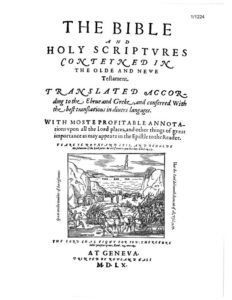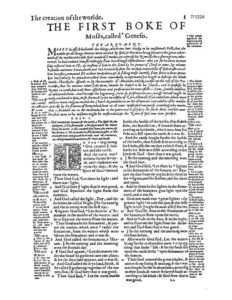
[ad_1]
By Mark Rathel, Ph.D.
Professor of Theology and Philosophy
Baptist Faculty of Florida
In quite a few locations, a “Struggle of the Bibles” is a Twenty first-century actuality. Some Christians favor the King James translation whereas different Christians choose a more recent translation.
However this debate is just not a brand new phenomenon. Earlier than the publication of the Licensed Model, often known as the King James Model, a battle developed over the difficulty of which English translation was greatest. The Bishops Bible, the Nice Bible, Miles Coverdale’s translation and William Tyndale’s translation of the New Testomony from Greek into English is a partial record of English translations on the time the Pilgrims arrived within the early seventeenth century.
The Pilgrims that landed close to Plymouth Rock in 1620 introduced with them from England a biblical translation revealed in 1560. The Geneva Bible was the primary full translation of the Bible from Hebrew and Greek into the English language.
‘Breeches Bible’
The Geneva Bible at occasions was nicknamed the “Breeches Bible” due to its translation of Genesis 3:7: “Then the eyes of them bothe have been opened & they knewe that they have been bare, and so they sewed figtreee leaves collectively, and made themselves “breeches.”

How did this English Bible produced in Geneva, Switzerland, turn out to be the Bible carried to the New World by the Pilgrims?
Because of the persecution of Protestants by Mary I, the Catholic queen of England and Scotland usually known as “Bloody Mary,” quite a few Protestants fled to Geneva.
John Knox of Scotland served because the pastor of a church of Englishmen and Scots. A department of the persecuted Protestants known as themselves “Pilgrims,” borrowing from the language of Hebrews 11:13: “All these died within the religion, and obtained not the guarantees, however acknowledged them from , and believed them, and obtained them fortunately, and confessed that they have been strangers and pilgrims on the earth.”
‘Bloody Mary’
Queen Mary prohibited the printing of Bibles in England. The persecution inflicted by Mary resulted in among the greatest biblical linguists of the day departing England for Geneva. These noteworthy students functioned as key translators of the Geneva Bible. Among the persecuted Pilgrims returned to England after Queen Mary’s dying and devoted the interpretation to Queen Elizabeth.
The acknowledged objective of the translators as set forth within the preface was to “set forth the purity of the phrase and proper sense of the Holy Ghost for the edifying of the believers in religion and charity.”
The Geneva Bible was a Bible of firsts.
- The Geneva Bible of the Pilgrims was the primary English translation to make use of verse numbers.
- The Geneva Bible comprises 5 maps, a biblical dictionary, a glossary of biblical names and the which means of the names with an exhortation for fogeys to decide on the names of their kids from the record to provide their kids testimonies by their biblical names.
- The Geneva Bible additionally contained a chronological chart.
Probably the most noteworthy function of the Geneva Bible was the marginal notes explaining the Scripture. Maybe due to the Geneva Bible, England’s King James in 1604 prohibited the usage of marginal notes in Bibles as a result of he regarded marginal notes as being “unfaithful, seditious, savoring an excessive amount of of harmful and treacherous conceits.”
Marginal notes
What sort of notes did King James discover offensive? Maybe the be aware on Titus 3:1 might serve for example: “Put them in remembrance that they be topic to the Principalities & Powers, & that they be obedient, & readie to each good work.”

The marginal be aware within the Geneva Bible acknowledged, “Though ye rulers be infideles, but we’re bounde to obey them in civil insurance policies, and the place thei command us nothing towards ye worde of God.”
In different phrases, the marginal be aware recommended disobedience to the king if he issued a command opposite to the phrase of God. Moreover, the marginal explanatory notes usually attacked the “Papistes” – the management of the Catholic Church.
For instance, the Geneva Bible translated Revelation 17:4 as follows: “And the girl was arrayed in purple and skarlat, and guilded with golde, and valuable stones, and pearles, and had a cup of gold in her and, ful of abominations, and filthiness of her fornication.”
The marginal be aware on this verse feedback: “This lady is the Antichrist, that’s, the Pope with ye complete physique of his filthie creatures, whose beautie onely standeth in outward pompe and impudencie and craft like a strumpet” [a female prostitute.]
Beloved phrases
Like all Bibles from the interval and the later King James Bible, the Geneva Bible contained the Apocrypha — Jewish literature written within the second to first century B.C. however not acknowledged as Scripture by Jews within the days of Jesus between the Previous and New Testaments.
In keeping with “The Cambridge Historical past of the Bible,” the Geneva Bible additionally used phrases that will turn out to be widespread in subsequent English translations, resembling “smote them hip and thigh,” “just a little leaven leaveneth the entire lump” and “cloud of witnesses.”
The Geneva Bible was a well-liked Bible for a number of generations. Even after the publication of the Licensed Model of King James, the Geneva Bible was the extra well-liked translation amongst Christians who didn’t belong to the Church of England below the headship of King James.
See extra photographs from the Geneva Bible on the hyperlinks under:
 Mark Rathel, Ph.D., is professor of theology and philosophy at Baptist Faculty of Florida in Graceville, Florida. He enjoys studying and writing in regards to the historical past of Bible translations.
Mark Rathel, Ph.D., is professor of theology and philosophy at Baptist Faculty of Florida in Graceville, Florida. He enjoys studying and writing in regards to the historical past of Bible translations.
[ad_2]
Source_link